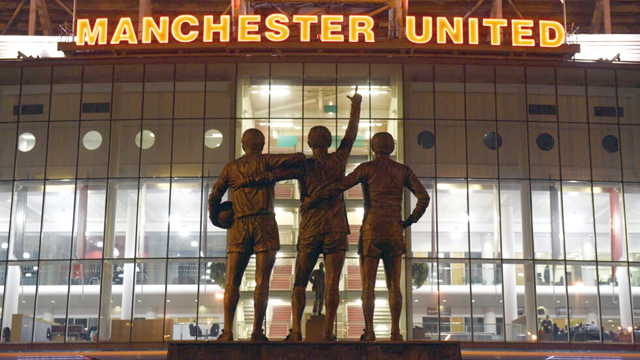You are here
Football backs ‘Fergie’, the greatest manager of all
By Reuters - May 06,2018 - Last updated at May 06,2018

In this file photo taken on March 10, 2016, Manchester United’s Scottish former manager Alex Ferguson reacts ahead of the UEFA Europa League round of 16, first leg football match between Liverpool and Manchester United in Liverpool, England (AFP photo by Paul Ellis)
LONDON — If the football world has been left so shocked by the news of the serious illness to Alex Ferguson, it is partly because the patriarch of Manchester United has always cut such a seemingly robust, indestructible figure, an unbeatable giant of the game.
The 76-year-old had emergency surgery for a brain haemorrhage on Saturday, yet, it was only less than a week earlier that he had been on the pitch at Old Trafford, looking in fine form and fettle while making a presentation to Arsene Wenger.
As he joshed with his old deadly Arsenal rival, it was a reminder how much the game has missed Ferguson since his retirement in 2013 and made one reflect once more about his towering, perhaps unprecedented influence in the modern game.
Indeed, whenever there is an argument among fans about who is the biggest sports personality of them all, Ferguson has always been right at the heart of the debate, a champion whose greatness was reflected in the clubs he managed.
A Scotsman who became the most successful manager ever in the annals of the English game, you could even make a convincing case for him being the world’s best down the years, so continually successful was he over such a long period.
In the fickle modern game, which treats managers as disposable tissues, Ferguson was immovable Glaswegian granite for more than quarter of a century, re-establishing and then constantly re-inventing United’s dazzle as the world’s most celebrated club.
His triumph was not just that he kept the United bandwagon rolling on unstoppably with different liveries but that he imbued each new red model with the same qualities of flair, panache and never-say-die commitment.
Explosive temper
“Fergie” time — and not just those dying minutes when his teams always seemed to come alive — was never dull. Neither were his pronouncements. “Football — bloody hell...” still stands as the perfect encapsulation of the game’s allure.
Where are today’s great manager-cum-dictators? Long gone. He was the last. What he said went. Cross him and you were history and when his explosive temper took over, his ideas left a lasting impression on his players.
No player at United was ever bigger than the club and none was ever bigger than “Fergie”. Not Eric Cantona, not Roy Keane, not even David Beckham.
Yet there were times when Ferguson gave a good impression of towering over the institution of United itself, so indispensable did he make himself at Old Trafford as the inheritor of the great Matt Busby’s mantle.
Indispensable? Well, ever since he departed, his shadow over the club that he led to so many trophies — 38 all told in his 27 years at Old Trafford, including 13 league titles, two European Cups and a Cup Winners’ Cup — United have never come close to recapturing the zest of his reign.
Indeed, his influence has cast a shadow over all his successors in the past five years, including the current incumbent Jose Mourinho, a serial winner, yet, one who is still not considered to be patch on Ferguson by United followers.
And it should never be forgotten that it was not just at United that he swept all before him.
Even before turning Old Trafford back into a theatre of winning dreams, he oversaw an extraordinary period of over achievement at Aberdeen in Scotland, smashing through the Celtic-Rangers duopoly with 10 trophies, including the European Cup Winners’ Cup.
That is the definitive answer to those who still suggest that at United he never had to build bricks from straw like Brian Clough, an old rival for Britain’s “greatest” manager tag, did at Derby County and Nottingham Forest.
Ferguson can claim to have done it all, from winning in Europe with an unfashionable smaller club, lifting league titles in two different countries, collecting European silverware with two clubs and annexing trophies in four successive decades.
Oh yes, and winning a unique treble of Premier League, FA Cup and Champions League titles in 1999, the year in which he was also knighted.
It’s why the football world is rallying around him, wishing for much more Fergie time with the full recovery of one of the sport’s most monumental characters.
Related Articles
LONDON — British billionaire Jim Ratcliffe’s deal to buy a 25 per cent stake in Manchester United is the latest twist in the remarkable stor
It will be no consolation to David Moyes or Manchester United but, in stark statistical terms, Moyes enjoyed more success in his first — and last — 51 matches in charge at Old Trafford than Alex Ferguson did.
LONDON — English football’s biggest club seems to have secured the services of the sport’s most colourful manager after Jose Mourinho, accor
















